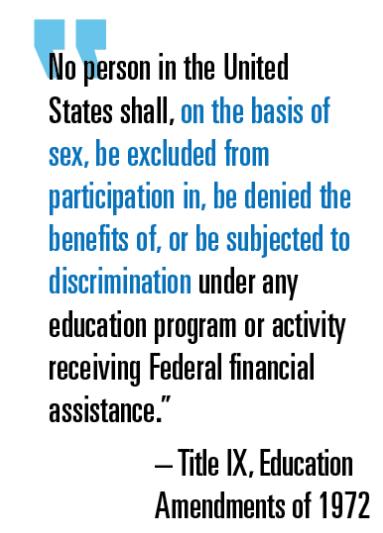Dedication At some point in our lives we are all plagued with health issues. I have been dealing with heart issues over the last ten years. My heart issues have


Dedication At some point in our lives we are all plagued with health issues. I have been dealing with heart issues over the last ten years. My heart issues have

I am now completing my forty-third year as a law professor at Marquette University Law School. In 1982, I taught a course at the law school with respect to the
A university has a vested interest to see that coaches’ contracts are contractually fulfilled, to prevent movement of a coach to a same or similar position during the term of the contract, especially within the same Conference, to prevent use of trade secrets or confidential information obtained during the coaching tenure, to prevent solicitation of enrolled student-athletes or recruits, and to minimize the outrageous costs of replacement.
Jason Been was a sports enthusiast. An avid baseball fan, a Brewers batboy, and a high school baseball star. Sports was his passion and ultimately became his lifelong avocation. This quiet and humble man became a universally respected genius in the sports industry. Jason Been was a statistical sports wizard, a walking encyclopedia of sports facts and figures, and a "go to guy'' in the industry. I had the privilege of discussing the business of sports with Jason on my Time Warner cable sports show, Sport$Biz. His knowledge, ability to prognosticate, and understanding of what has now become a multi-billion dollar industry was only to be admired.
Gene “Geno” A. Ford went into coaching after his years in college, taking a job as an Ohio assistant coach. In 2007-2008 he was appointed as an assistant coach at Kent State University (Kent State) and became the head basketball coach of Kent State in 2008. On or about April 1, 2008, Ford and Kent State entered into their initial Employment Contract which was for a four year term with an option for a fifth year by mutual agreement of the parties.
Head Coach Accountability - New Standard. In October of 2012, NCAA Bylaw 11.1.2.1 was created to read as follows: It shall be the responsibility of an institution's head coach to promote an atmosphere for compliance within the program supervised by the coach and to monitor the activities regarding compliance of all assistant coaches and other administrators involved with the program who report directly or indirectly to the coach. As a result of NCAA Bylaw 11.1.2.1, an institution's head coach is presumed to be responsible for the actions of all assistant coaches and administrators who report directly and indirectly to the head coach. Under the new Bylaw, a head coach is required to cultivate an atmosphere of compliance within his program and to monitor the activities of all assistant coaches and administrators involved with the program who report directly or indirectly to the head coach. The new legislation holds head coaches directly accountable for NCAA violations by members of their coaching staff.
At the time I wrote the article in Greenberg's Coaching Corner entitled "Steve Alford - Coaching Free Agency is Just a Matter of Money," Steve Alford's (Alford) completed UCLA contract was not available. A contract entitled Full Time Coach, Talent Fee & Camp Agreement - Men's Basketball dated as of March 30, 2013, by and between The Regents of the University of California and Steve Alford was recently released pursuant to an open records request. In that article I referenced a statement by UCLA Athletic Director Dan Guerrero that Alford would receive a $200,000 signing bonus, which was the amount Alford claimed he owed University of New Mexico (UNM) by virtue of his early termination. On May 17, 2013, it was announced that UNM had agreed to accept $300,000 of their original million dollar demand for early termination as a result of the Term Sheet executed by Alford on March 18, 2013. UNM also announced that the settlement resulted in a net benefit of approximately $625,000 to UNM. The additional $325,000 represented compensation that was not paid to Alford in the form of bonuses, incentives, and deferred compensation.
Steve Alford became the head basketball coach at the University of New Mexico (UNM) on March 23, 2007, replacing the fired Ritchie McKay. During his stay at the UNM he amassed 155 wins and 52 losses. Alford executed his first contract with UMN on June 26, 2007. Paragraph 7 of that contract, entitled, Termination by Request of Coach Alford, stated: Coach Alford may terminate this Agreement at any time upon thirty days notice to the VPIA. In the event that Coach Alford voluntarily terminates this agreement, the University shall have no further liability except for base salary and benefits accrued to the date of termination, a pro rata share of the Other Compensation described in paragraph 3.b.5, above, but there shall not be any liability as to the Deferred Compensation except, and only, as provided in paragraph 3d, above.
College coaches' contracts for public institutions, unless limited by some state law exception, are open to the public for review. By making an open records request, universities will provide copies of coaches' contracts and any amendments thereto. From a review of the coach's contract and what is reported by the coach to the university with respect to athletically related income, plus a determination as to whether bonuses prescribed were achieved, one could come to a fairly good understanding of what a coach's total compensation package approximates.
The college coach of today is required not only to be an instructor, but also act as a fund raiser, recruiter, academic adviser, public figure, budget director, television, radio and internet personality, alumni glad-handler, and any other role that the university's athletic director or president may direct him to do. Sports sociologists would opine that college coaches suffer from a condition known in the social science discipline as ‘role strain;’ that is, they have far too many roles to fill at very high levels of performance. It is no wonder why big time college coaches are compensated the way they are -- the job environment dictates the high compensation level.